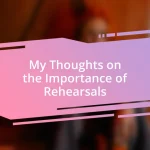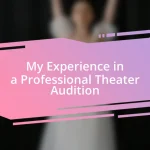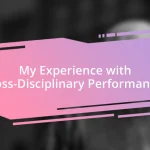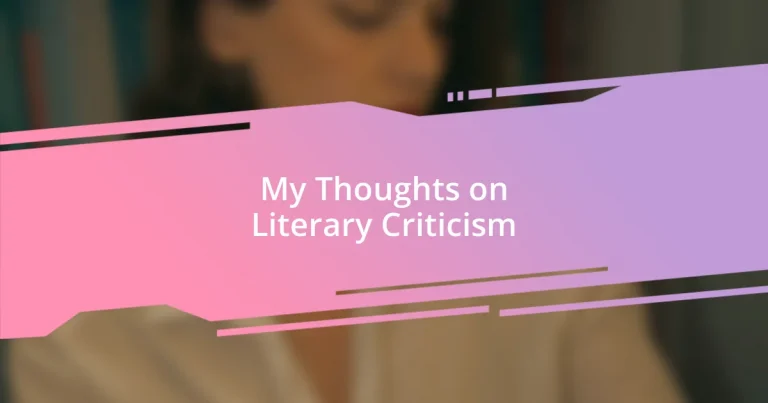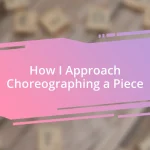Key takeaways:
- Literary criticism enhances the reader’s understanding by decoding complex themes, emphasizing personal connections, and fostering engaging discussions about literature.
- Various approaches to literary criticism, such as formalism, postcolonial, and feminist criticism, provide different perspectives that enrich one’s interpretation of texts.
- Effective literary criticism involves tools like close reading, applying critical theories, and engaging in dialogue with others, highlighting the importance of personal experiences and reflections in analysis.
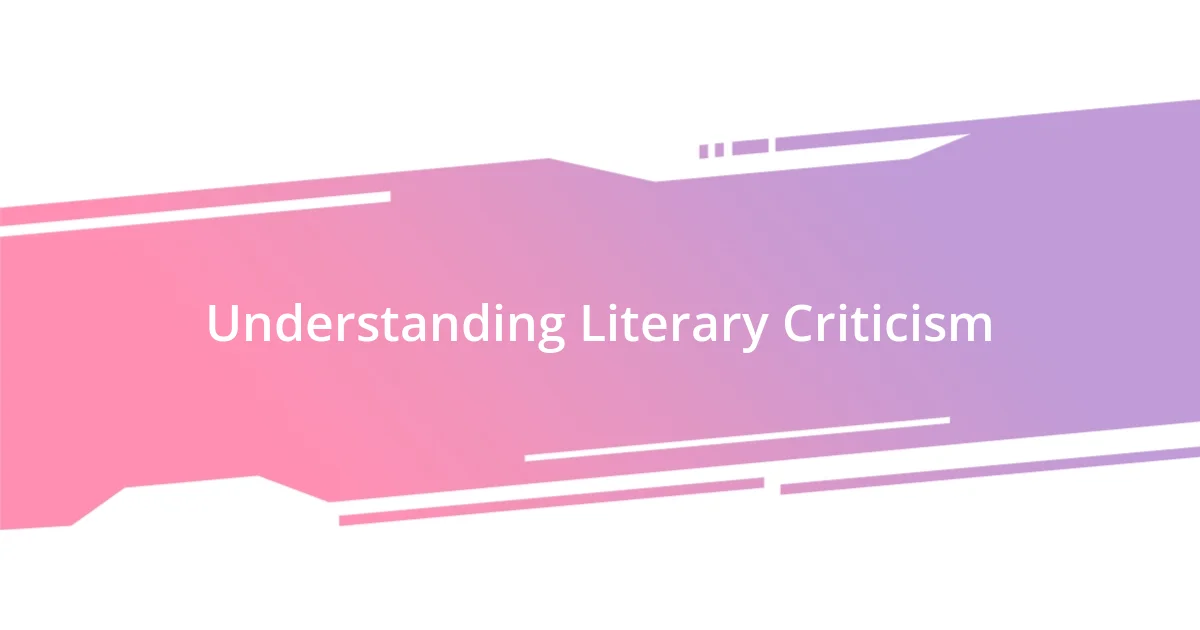
Understanding Literary Criticism
Literary criticism, at its core, is a lens through which we examine and interpret the art of literature. I remember picking up a classic novel and feeling overwhelmed by the depth of its themes. It wasn’t until a friend introduced me to literary criticism that I discovered how to unravel those complex layers.
What fascinates me about literary criticism is that it isn’t just a dry analysis; it allows for personal connection with the text. Have you ever read something that resonated with you on an emotional level? That’s what literary criticism seeks to explore—the relationship between the reader and the work. I often find myself reflecting on how my own experiences influence my interpretation, making each reading a unique dialogue.
While some might think of literary criticism as merely academic, I see it as a vibrant conversation. It’s an opportunity to challenge and expand our understanding of what a text can offer. In my experience, engaging in discussions about literature has not only deepened my appreciation for various works but has also provided me with fresh perspectives I would have never considered on my own. Isn’t that the beauty of literature? The more we dissect it, the richer our enjoyment becomes.
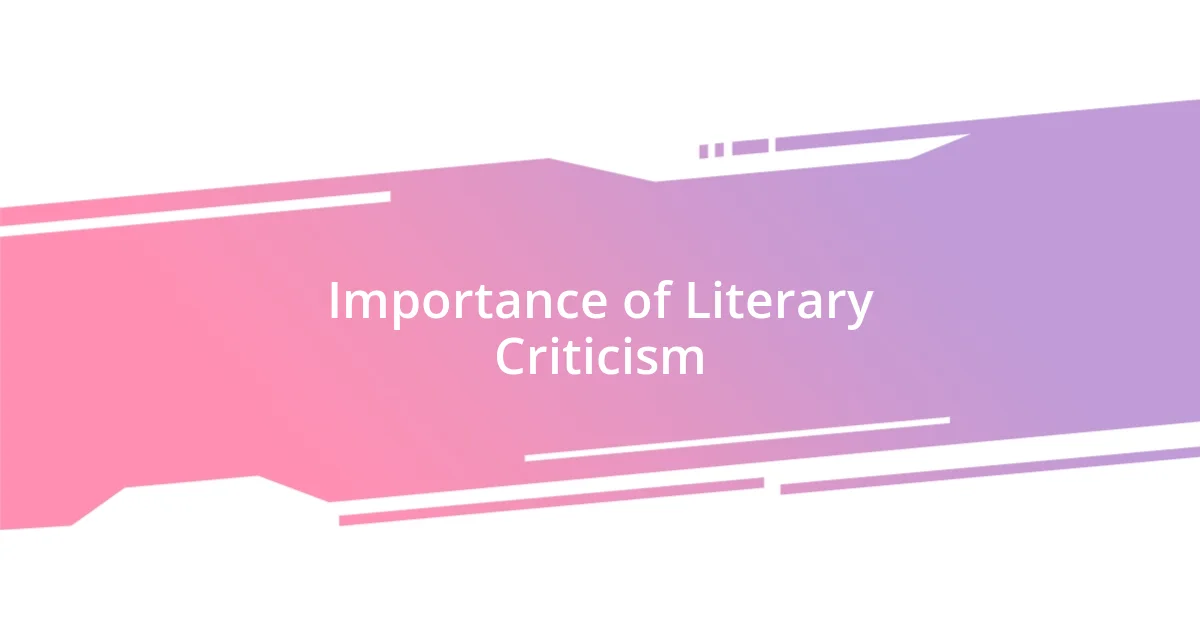
Importance of Literary Criticism
The importance of literary criticism cannot be overstated. It serves as a vital tool for both readers and writers, opening doors to deeper understanding and appreciation. I remember reading a Shakespearean play and feeling utterly lost until I stumbled upon a critic’s analysis. That moment was transformative, sparking my curiosity and helping me connect the dots between the language and the underlying human experiences.
Here are some key reasons why literary criticism is essential:
– Enhances understanding: It decodes complex themes and symbols that may go unnoticed on a first read.
– Encourages diverse perspectives: Critics often provide insights that challenge my own views, enriching my reading experience.
– Fosters emotional connections: By highlighting the emotional undertones of a text, criticism allows readers to relate their experiences to the narrative.
– Supports the craft of writing: Writers can learn about the impacts of their choices through critical feedback, aiding in their development.
– Sparks thought-provoking discussions: Delving into criticism promotes conversations that deepen our appreciation for literature and its societal impact.
I often find myself referencing various critiques when discussing books with friends. It sparks lively debates about character motivations or underlying themes, making literature feel alive and dynamic. Such exchanges remind me that literary criticism isn’t just about analysis; it’s about celebrating and engaging with the stories that shape our lives.
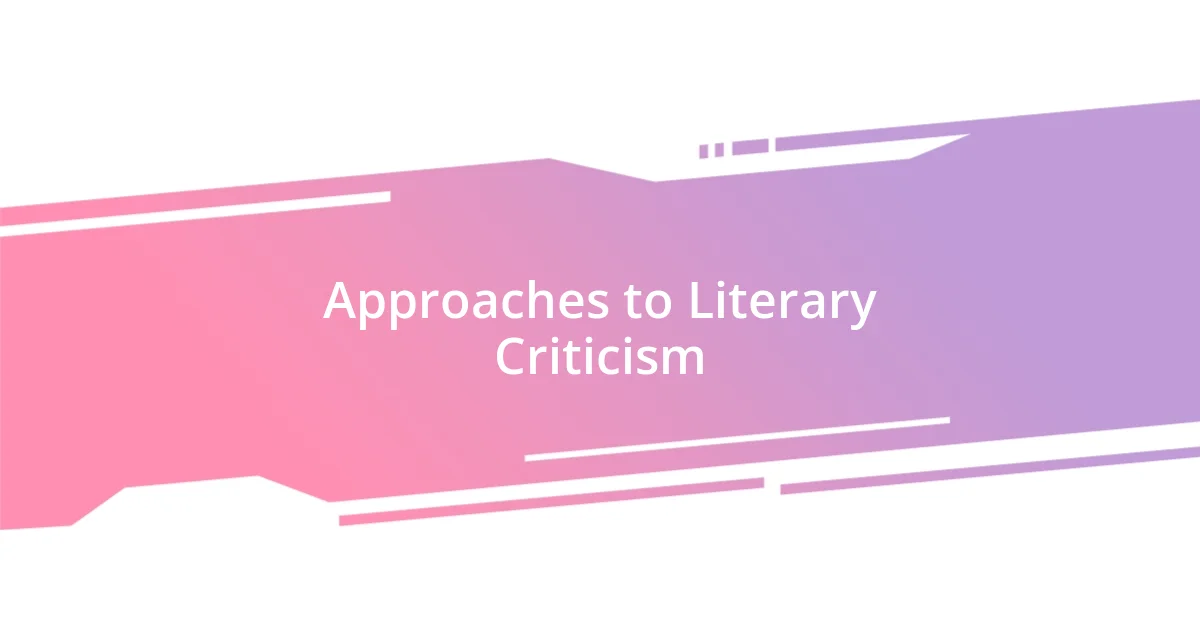
Approaches to Literary Criticism
The world of literary criticism is vast, with various approaches each shedding light on different aspects of a text. Some traditional methods, like formalism, focus strictly on the structure and language of the work. Personally, I remember trying to read a poem through this lens and discovering how every word choice impacted the overall meaning. It felt like peeling back layers to reveal a treasure trove of insight.
Then there are more contemporary methods, such as postcolonial criticism, which examines literature’s role in reflecting cultural identities and power dynamics. When I explored works by authors from diverse backgrounds, this approach helped me understand their narratives in a richer context. It’s fascinating how the same text can evoke such varied interpretations based on the critic’s perspective.
Finally, feminist criticism provides a critical voice regarding gender representations in literature. I recall reading a classic novel and recognizing the often stereotypical portrayals of female characters. Engaging with feminist critiques opened my eyes to the deeper discussions of identity and agency, enriching my reading experience profoundly. It underscored the point that literary interpretations are not just academic; they resonate personally in our lives.
| Approach | Description |
|---|---|
| Formalism | Focuses on the text’s structure, language, and literary devices to derive meaning. |
| Postcolonial Criticism | Examines literature’s relationship with colonialism and its impact on cultural identities. |
| Feminist Criticism | Analyzes texts through the lens of gender, exploring female representation and agency. |
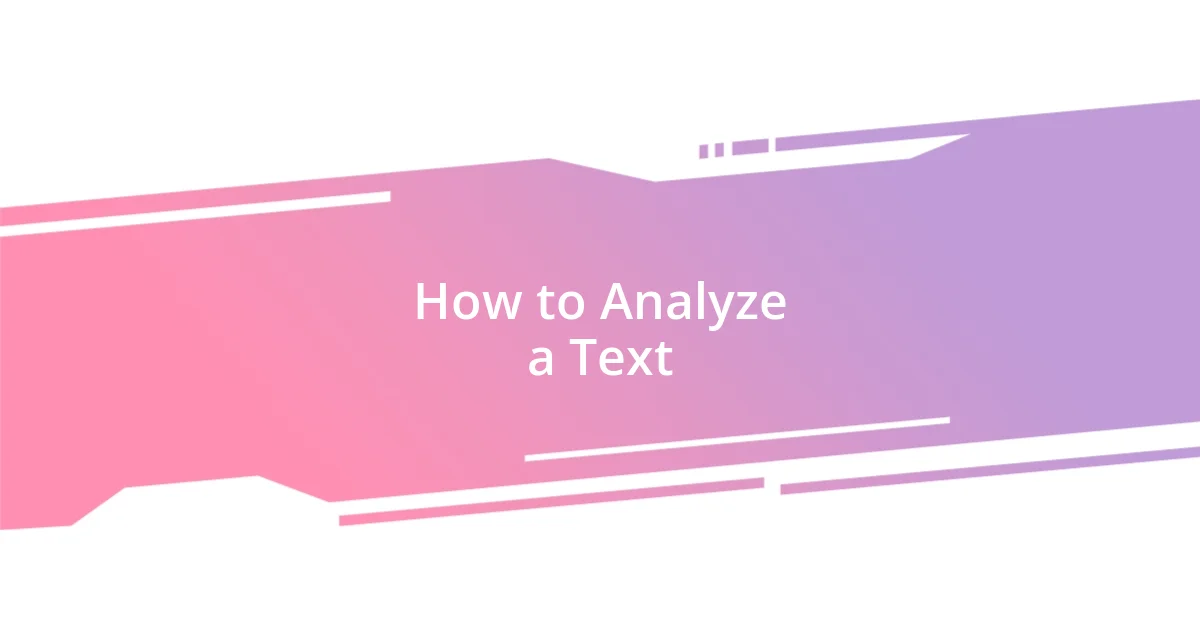
How to Analyze a Text
To analyze a text effectively, I find that it’s crucial to first identify its central themes. When I read a novel, I often ask myself, “What core message resonates beneath the plot?” This simple introspection leads me to uncover nuances I might have easily overlooked. For instance, while diving into a contemporary fiction piece, I was surprised to see how themes of isolation subtly threaded through the characters’ interactions, which deepened my appreciation for the narrative.
Next, it helps to examine character motivations. I often reflect on questions like, “What drives this character’s actions?” or “How do their choices shape the story’s outcome?” I remember grappling with a story where the protagonist’s decisions seemed irrational initially. However, after a thorough analysis, I realized they were rooted in past trauma, transforming my understanding from frustration to empathy. This type of engagement can dramatically shift one’s interpretation of the text.
Finally, don’t underestimate the power of historical context. Every time I explore a piece written in a specific era, I consider, “How does the historical backdrop inform the work?” This approach has opened my eyes to how societal issues influenced not just the plot but also the characters’ development. Reflecting on a classic novel, I was able to see how gender norms impacted character interactions, which made the narrative feel more relevant to today’s discussions on equality. Analyzing a text in this way enhances engagement and fosters a deeper emotional connection to the characters and their journeys.
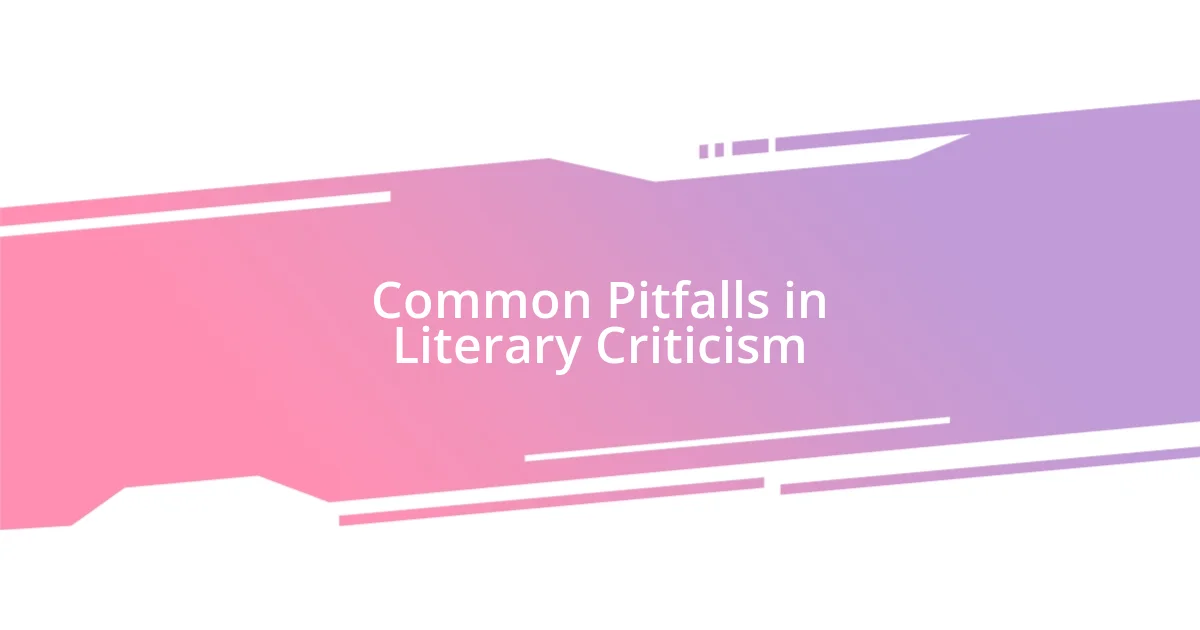
Common Pitfalls in Literary Criticism
It’s easy to fall into the trap of letting personal biases cloud our judgment in literary criticism. I remember when I first picked up a renowned novel that everyone raved about. I approached it with such high expectations but found myself disappointed because it didn’t resonate with my experiences. That emotional disconnect made me question the validity of my critique and reminded me that our perceptions are often shaped by our backgrounds and emotions.
Another common pitfall is the tendency to overanalyze. I’ve caught myself getting lost in arcane symbolism or obscure references, forgetting that sometimes a cigar is just a cigar. It’s exhilarating to recognize deeper meanings, but I’ve learned that not every element of a text is weighted with significance. Striking a balance between critical depth and readability becomes key. Why do we often seek complexity over clarity, especially when it’s easier to engage with a text on a more straightforward level?
Lastly, I’ve noticed that critics can sometimes focus too much on form and technique rather than the emotional journey of the characters. I once dissected a modernist piece, reveling in its intricate structure and fragmented narrative. Yet, it wasn’t until I stepped back and focused on the characters’ emotional struggles that I fully appreciated the narrative’s impact. This experience taught me that while technique is essential, the heart of a story often lies in its ability to evoke empathy and connection with readers. Isn’t that what we all seek when we read?
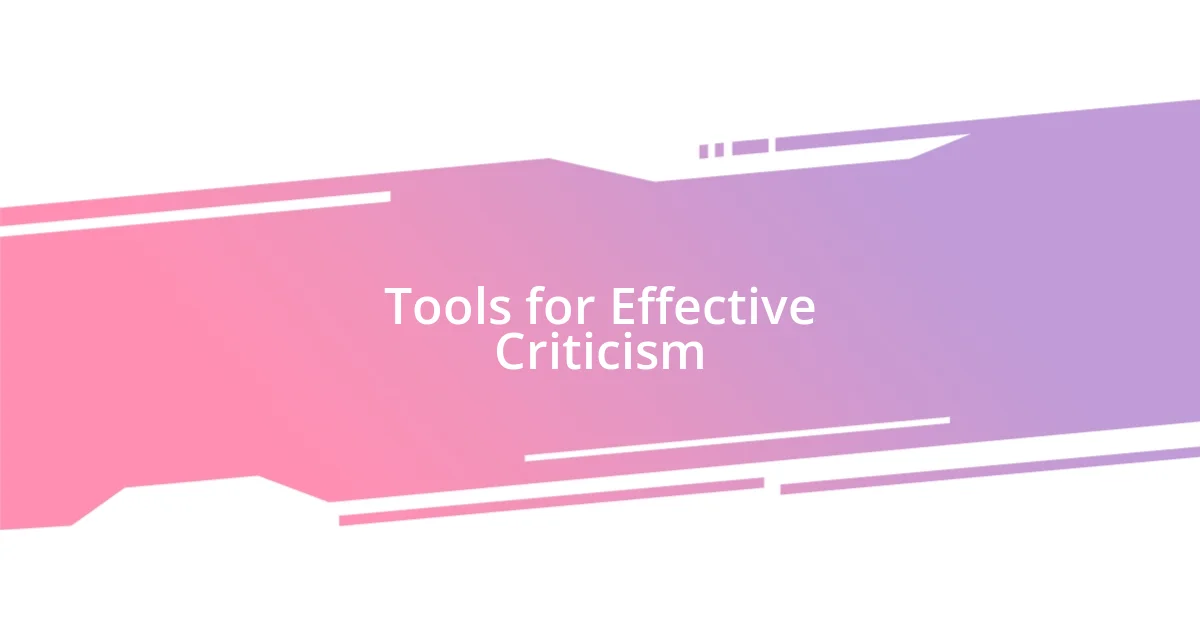
Tools for Effective Criticism
To engage in effective literary criticism, I often reach for a few essential tools that sharpen my analysis. One of my favorites is the practice of close reading. I vividly remember poring over a single passage in a poetry collection, discovering layers of meaning that completely transformed my interpretation of the entire poem. Just by focusing on the particular word choices and punctuation, I realized how deeply the poet expressed emotion. Have you ever taken the time to dissect a line? The insights gained can be incredibly rewarding.
Another useful tool is the application of critical theories. Depending on the text, I’ve sometimes approached my reading through a feminist lens or a post-colonial perspective. I recall analyzing a novel that drew heavily on colonial history; when I layered in historical and cultural contexts, it felt like peeling back the front of a beautifully wrapped gift to reveal the complexities inside. It helped me understand not just the story, but also the profound implications behind the characters’ lives. Isn’t it fascinating how a shift in perspective can open up the narrative?
Lastly, engaging in dialogue with others about the text is invaluable. I cherish the moments when my book club dives deep into a novel, each member bringing their unique experiences and viewpoints. I remember a heated discussion about a character’s morality where we all had different takes. That back-and-forth not only expanded my understanding but also made me reconsider my initial thoughts. How often do we miss out on profound insights because we read in isolation? Sharing our interpretations can enrich our reading experience immensely.
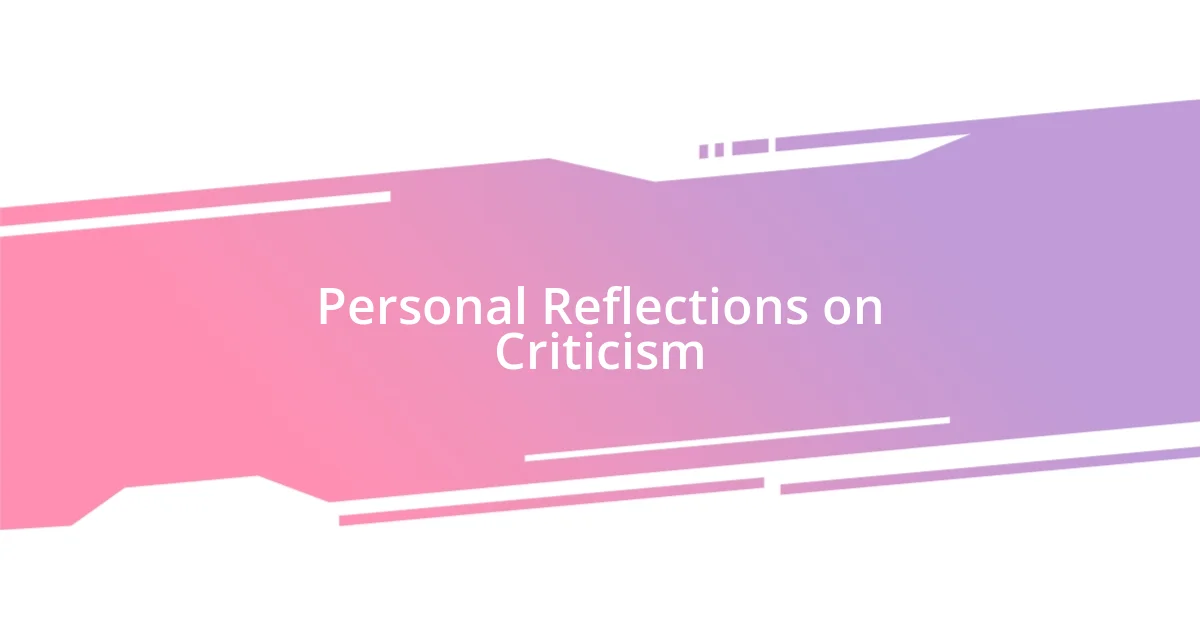
Personal Reflections on Criticism
Reflecting on criticism, I often find myself grappling with how much my personal journey influences my viewpoints. For instance, I once critiqued a novel centered around grief shortly after losing a loved one. My emotional turmoil colored my interpretation, and I realized that my response was less about the author’s intent and more about my own unresolved feelings. This experience taught me that while our emotions can enrich our understanding, they can also skew our perceptions if we aren’t aware of them. Have you ever noticed how your mood affects your interpretation of a text?
I also think about the moments I’ve struggled to articulate my critiques clearly. There’s a specific book that left me feeling exhilarated yet speechless, as if it had touched a part of my soul. I remember attending a literary seminar and stumbling over my words when trying to express my thoughts. It highlighted for me how challenging it can be to translate profound experiences into concrete critiques. In those moments, I learned the value of taking time to gather my thoughts and refine my ideas before contributing to discussions. Have you experienced the pressure of articulating a love for a text only to have your mind go blank?
As I dive deeper into literary criticism, I realize that personal reflections can lead to richer analyses. Recently, during a discussion about a dystopian novel, I shared how the story mirrored my own fears of societal collapse. That openness sparked a lively conversation where others connected their fears to the narrative as well. It was a poignant reminder that literature doesn’t exist in a vacuum; our individual experiences and collective narratives can breathe life into our analyses. Don’t you think that sharing personal insights can transform a critique into something more engaging and relatable?
